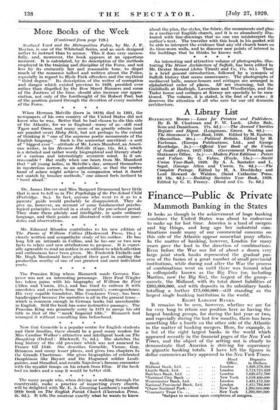When Herman Melville (born in 1819) died in 1891, the
newspapers of his own country of the United States did not know who he was. Better that he had chosen to die this side of the Atlantic, for we in England—many of us—still read Typee and Omoo, and many more of us greatly admire (and are puzzled over) Moby Dirk, but not perhaps to the extent of thinking it " one of the supreme poetic monuments of the English language." Such is the somewhat uncritical—a sort of " biggest ever "—attitude of Mr. Lewis Mumford, an Ameri- can writer, in his Herman Melville (Cape, 12s. 6d.), which is a detailed and rather wordy biographical and literary study of a curious and interestingly eccentric mind. Is it un- reasonable ? But really when one hears from Mr. Mumford that " all young ladies, in Melville's day, arrayed themselves in mysterious sorrow, as an aphrodisiac, so that the tender hand of solace might achieve in compassion what it dared not snatch by brasher methods," one almost feels inclined to "howl aloud."


































 Previous page
Previous page